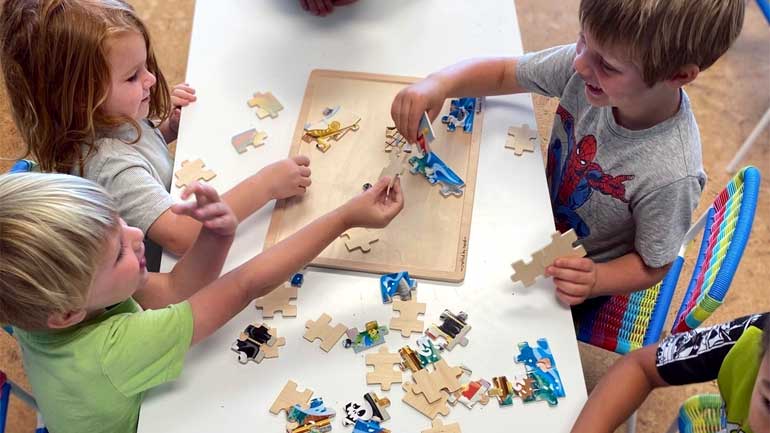
Play-based learning is not a new phenomenon. In fact, children have been learning through play throughout history. However, in recent years more attention has been focused on how to provide the best learning environment possible for children.
After all, the better the environment, the more they will learn and the greater their chance of success later in life.
What Is Play-Based Learning?
In the past, t was common for nurseries and schools to have a set program. Children would be expected to sit in class, in rows, at desks. They would then be talked at and hopefully, some of the information being passed on would stay with them.
This approach is reinforced by tests to promote learning.
However, play-based learning takes a different approach. Instead of rigorously structured lessons, play-based learning encourages children to play.
The play can be guided by the teacher/carer or they may encourage the child to choose their own activity. This is instantly more appealing and, therefore, you’ll find it much easier to capture their attention.
By guiding the play you can encourage children to learn to count when stacking and knocking down blocks. You can even use water play to look at volumes and weights!
How It Helps Academically
When children are young they have a natural curiosity about the world around them. They are also capable of soaking up information. However, in most cases, they also have a short attention span. That means the amount of information they absorb is limited by the amount of time you can hold their interest.
However, if you use play to teach basic principles the children are less likely to lose interest and will learn more.
This has a direct knock-on effect on their future academic skills. Children that develop a passion for knowledge and an understanding of basic principles when they are young are more likely to be interested in traditional lessons.
This means they are not just better prepared for academic learning, they are interested in the subjects and this will help them to learn more. As a bonus children also generally feel more in charge of the process, which helps to maintain interest.
Obviously, there is no guarantee that academic success leads to success in life. However, it will certainly open more doors and the greater the number of opportunities the more likely it is that your child will find something they are passionate about.
In short, academic success can help with life success. A love of academia starts with an introduction to a variety of subjects and principles through play-based learning.
As an added bonus you’ll get to enjoy the time you spend with your child as they learn new skills.
Independence
It should be noted that while academic prowess is desirable, your child also needs to learn social skills in order to flourish in life. Play-based learning has been shown to bolster self-confidence, independence, and the ability to interact with others.
In short, play-based learning doesn’t just give your child a boost academically. It will also help them to have the confidence to tackle new situations, follow their own convictions, and create success n their own terms.
Of course, part of the learning experience and subsequent success rests on choosing a reputable child care provider. This is important as most parents cannot dedicate the time a child needs to learning. Using a child care provider means you can spend quality time with your child, reinforcing what they are being taught.
As a parent, there is no better reward than watching your child make it on their own terms!




